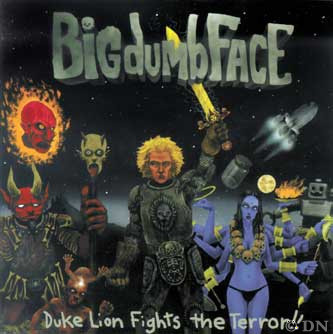
Forgotten Classics: Big Dumb Face
Heavy metal and comedy can be a caustic combination. The frequently acerbic nature of either medium can, if not properly mixed and settled, create an overly acidic and tartly sardonic solution that is unfit for consumption.
Yet somehow, out of the least likely of component ingredients, there came a pretty solid success story of “metal comedy.” Big Dumb Face was a figurative exorcising of closet dwelling skeletons for Limp Bizkit guitar guru Wes Borland. All in one swoop, he took inspiration from the band Ween and raked their base idea over his tempered metal coils, thus producing a symphony of ill-mannered nonsense and cacophonous noise.
What's always been the most curious (and tantamount to that, the most frustrating,) about Big Dumb Face is the exhibition of Wes Borland's creative versatility. "Duke Lion Fights the Terror" was recorded just prior to that little hissy-fit that Borland threw where he resigned from Limp Bizkit over repeatedly "selling-out." (This would in turn lead to the infamous one-pizza audition incident before Borland eventually rejoined the band.)
Even though it was spoken in hushed tones or sandwiched between more visceral arguments against the band, all metal heads would avert their eyes and quietly admit that Wes Borland was a curious talent. More than once, it was lamented that such a unique player should be chained within such a mediocre framework.
Suddenly unshackled, armed with a fusillade of riffs that Limp Bizkit had rejected and able to compose the pieces that issued forth from his own quirky psyche, Borland wrote a series of whimsical, menacing, wonderfully demented tales. In certain light, it’s easy to detect the kind of one-two beat that would have been the backbone of another milquetoast Limp Bizkit hit in another universe, particularly “It’s Right in Here.”
What separates Big Dumb Face from most efforts at musical comedy is the sheer infectiousness of the each of Borland's excellently imaginative riffs. Often bending convention and venturing into unusual or chromatic scales, he conjures a mood that concurrently complements the off-the-wall subject matter and lures the listener in with tightly crafted and well executed lines. “Fightin’ Stance” is a pretty stupid song even by the tenets of Big Dumb Face, and yet the riff is possessed of a swampy throatiness.
What makes the humor work on “Duke Lion Fights the Terror” is the sheer caliber of its ridiculousness. Often, metal humor is taken too close to heart by fans and so the needling and comedic overtures quickly turn sour to the listener. Admit it, metal fans; we’ve become so accustomed to people who don’t “get” metal that we are quick to level that barrel at any perceived slight. Rather, in the case of Big Dumb Face, the humor, such as it is, is so blatantly absurdist as to render taking it seriously impossible. I dare anyone to draw a single parallel between anything in metal and the context of the song “Mighty Penis Laser.”
If you can get past the occasionally annoying squeal of Borland’s helium-simulated vocals, there are whimsical moments from each end of the album. “Rebel” is a fun romp notable for the fact that it has no real riff; just a succession of single chords.
Worth noting apart from the album’s other tracks is “Voices in the Wall,” which rather than aspire at humor, is cut from a different cloth altogether. The song is almost hypnotic and the vocals have a cautiously hopeful twinge beneath the layers of melancholy gibberish. Despite, or perhaps because of its differences from the other tracks on the album, “Voices in the Wall” is the album’s single best offering.
In an odd twist (on an odd album,) the songs where Borland attempts to push the metal throttle to the wall are the two worst on the album. With the exception of the sampling from “Strange Brew” on “Organ Splitter,” that song and “Burgalveist” get lost in their own sonic clamoring.
Critical reception to “Duke Lion Fights the Terror” in 2001 was mixed, and with good cause. The album’s concept is so scattershot that it’s unfathomable to call the album a cohesive whole. For every smirking moment like the speed country repetition of “Duke Lion,” there is an ill-advised attempt at some kind of trip-hop like “Kali is the Sweethog.”
If you have a little extra space on your shelf, take a cautionary trip into the realm of “Big Dumb Face.” I don’t turn to it more than a couple times a year, but it comes in handy when my bass playing gets stuck in a lull, or I have an appetite for something completely different. Sometimes, you just need a chuckle, and a song like “Blood Red Head on Fire” is the perfect panacea.

